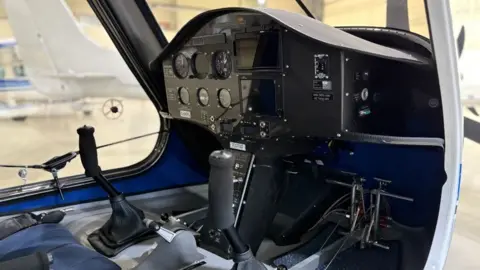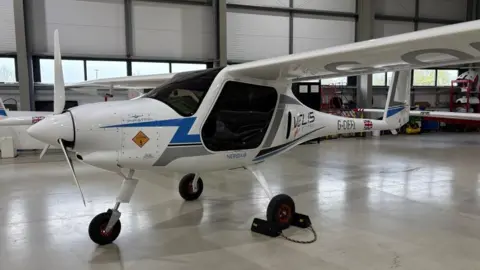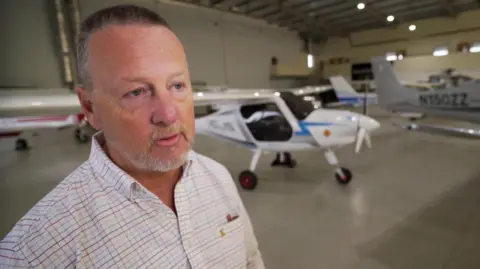Plans announced to propel aviation innovation
 Jonny Michel/BBC
Jonny Michel/BBCPlans have been announced aimed at propelling Norfolk to the forefront of aviation innovation in the UK.
Saxon Air, based at Norwich Airport, said it already owned what was thought to be the only certified electric plane in the world.
The Dutch firm now hopes to connect rural communities by using drones to help get people around the county.
Norfolk County Council said it backed plans for the creation of an Aviation Development Zone.
Alex Durand, chief executive of Saxon Air, said being able to unlock further growth and connectivity in clean innovation was a "once-in-a-generation opportunity".
"The region has the airspace, innovators and aviation expertise to enable this, making it ideally placed to advance the latest clean aviation technologies," he said.
"The strategy we're announcing can give rural communities better connectivity, inclusively unlock new skills, and raise aspirations by showcasing innovation and opportunities."
 Jonny Michel/BBC
Jonny Michel/BBCSaxon Air handles 45,000 passengers each year - many of them offshore workers - and said it wanted to focus more on sustainable travel.
Its headquarters at Norwich Airport has a roof with 470 solar panels to help power its electric plane.
The company also has a drone platform, and John Dewing, director of operations, believed developing this technology would "future proof" the company and "push the boundaries" in green innovation.

SaxonAir hopes drones could be used to transport people around the county, cutting a journey from Norwich to King's Lynn from about 60 minutes to 15 minutes.
"We fly helicopters so what's the next thing for a helicopter, a drone," Mr Dewing added.
"We're trying to push the boundaries to tie up civil aviation with what is the private side, or the hobby side, to make it more of a viable project."
However, Norfolk County Council said it wanted to see the government invest in the county and hoped it could become a "leader rather than a follower" in aviation innovation.
Chris Starkie, the council's director of growth and investment, said: "[Norfolk] has the potential to be a leading centre, if not, the leading centre for research and development in new exciting aviation products.
"We are also branching out into areas like drone technology... I think we have the skills and the talent and the space, so it is the perfect combination."
Follow Norfolk news on BBC Sounds, Facebook, Instagram and X.
